A top opponent of Indian Prime Minister Narendra Modi urged his compatriots to resist “dictatorship” on Saturday, after the country’s top court provisionally released him from jail to campaign in the ongoing general election.
Arvind Kejriwal, chief minister of the capital Delhi and a key leader in an opposition alliance formed to compete against Modi in the polls, was granted bail on Friday after weeks in custody.
He is among several leaders of the bloc under criminal investigation, with his party describing his arrest as a “political conspiracy” orchestrated by the ruling Bharatiya Janata Party (BJP) to sideline its opponents ahead of the vote.

In a defiant press conference the day after his release, Kejriwal said the outcome of the election would determine whether India remained a democracy.
“I have come to beg 1.4 billion people to save my country,” he said. “Save my country from this dictatorship.”
Kejriwal also personally accused the prime minister of targeting his opponents with criminal probes.
“Modi has started a very dangerous mission,” he said. “Modi will send all opposition leaders to jail.”
Kejriwal’s government was accused of corruption when it liberalised the sale of liquor in 2021 and gave up a lucrative government stake in the sector.
The policy was withdrawn the following year, but the resulting probe into the alleged corrupt allocation of licences has since led to the jailing of two top Kejriwal allies.

Rallies in support of Kejriwal, who refused to relinquish his post after his arrest, were held in numerous other big cities around India after he was taken into custody.
More than 1,000 cheering supporters greeted him as he walked free from the capital’s Tihar Jail on Friday night.
Kejriwal, 55, has been chief minister for nearly a decade and first came to office as a staunch anti-corruption crusader.
He had resisted multiple summons from the Enforcement Directorate, India’s financial crimes agency, to be interrogated as part of the probe.
Kejriwal has consistently denied any wrongdoing since allegations of corruption were first levelled against him, including again on Saturday.
“They sent me to jail and the PM says he is fighting against corruption,” he said.
“If you want to fight corruption, learn from Arvind Kejriwal.”

The Supreme Court said on Friday he could temporarily leave jail to campaign in India’s six-week election, on the condition that he returns to custody after the last day of voting on June 1.
“No doubt, serious accusations have been made, but he has not been convicted,” the court’s ruling said. “He is not a threat to the society.”
His release was also made conditional on his agreement not to make public comment on the case against him, not to interact with witnesses in the case and not to visit the offices of the Delhi government.
Modi’s political opponents and international rights groups have long sounded the alarm on India’s shrinking democratic space.
US think tank Freedom House said this year that the BJP had “increasingly used government institutions to target political opponents”.

Rahul Gandhi, the most prominent member of the opposition Congress party and scion of a dynasty that dominated Indian politics for decades, was convicted of criminal libel last year after a complaint by a member of Modi’s party.
His two-year prison sentence saw him disqualified from parliament until the verdict was suspended by a higher court, and raised concerns over democratic norms.
Kejriwal and Gandhi are both leading members of an opposition alliance composed of more than two dozen parties that is jointly contesting India’s election.
Voting is conducted in seven phases over six weeks to ease the immense logistical burden of staging the democratic exercise in the world’s most populous country.
Four more rounds will be staged over the coming weeks, with results expected on June 4.


